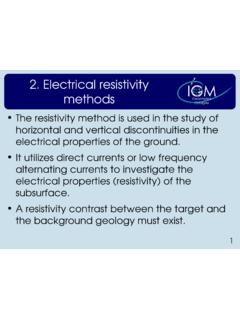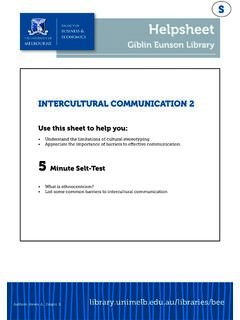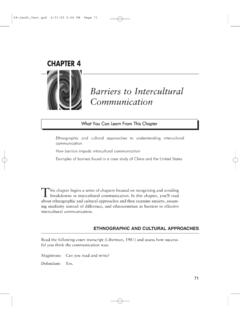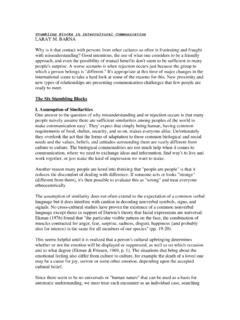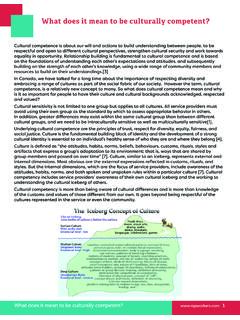Transcription of Intercultural Communication - Technical University of Valencia
1 54 After reading this chapter, you should be able to: Define and explain the importance of Intercultural Communication . Describe the role Intercultural Communication plays in communicating effectively. Define culture and co-culture and what it means to possess a cultural identity. Explain the six dimensions or frameworks for studying cultural differences. Distinguish among assimilation, accommodation, and separation strategies and their purpose. Objectives CHAPTER THREE Intercultural Communication Page 54 6/5/08 2:13:55 AM Page 54 6/5/08 2:13:55 AM user-s198/Volumes/204/MHSF040/mhhyb09/hy b09ch03/Volumes/204/MHSF040/mhhyb09 Page 55 5/12/08 4:39:19 PM Page 55 5/12/08 4:39:19 PM user-s180/Volumes/204/MHSF040/mhhyb09/hy b09ch03/Volumes/204/MHSF040/mhhyb09/hyb0 9ch0356 Part 1 Basic Principles of Communication M Y NAME IS STANLEY MARTINEZ, AND I WAS INTRODUCED TO gangs, drugs, and violence at an early age.
2 My uncle, a burly man covered in tattoos who was just released from the state penitentiary, taught me the rules of our neighborhood, and those rules, along with drugs and alcohol, served as my school of survival. I grew up fast, and the inner strength gained from my uncle s advice, my ability to watch and listen, and my common sense caused the homeboys I ran with to make me their gang leader. Their trust in me not only gave me courage and comfort but it also empowered me. They also broadened my perspective. All through my life it was as if I were outside myself looking in, and when I lost gang members because of useless deaths on the street, addictions to drugs, and unwanted pregnancies, I realized I had a higher purpose. A member of the Chicano Youth Center (CYC) helped me secure a job, and my employer put me in contact with the Educational Opportunity Program (EOP), which helped me enroll in college.
3 In ethnic studies classes I learned of my heritage, and I didn t just begin to appreciate my culture, I began to proudly share it with others. For my first speech in my speech Communication class, I dressed as a gang mem-ber and talked about my life story. Halfway through the speech I took off a layer of clothing to reveal a shirt and tie, and I talked about the biases and prejudices of mainstream society that push down members of our ethnic cultures. It was in my speech Communication class that I made a commitment to dedicate my life to break-ing down the barriers that prevent homeboys and homegirls from entering college. In this chapter we first look at the role of Intercultural Communication in com-municating effectively and in strategic flexibility. Then we look at the word culture and the importance of understanding your role as a cultural being.
4 In the next section, we discuss the importance of Intercultural Communication . Then we relate this topic to the model of Communication discussed in Chapter 1. We present six dimensions or frameworks for studying cultural differences. There are four barri-ers to Intercultural Communication , and we examine how to deal with the barri-ers which includes a discussion of dominant and nondominant cultures. We look at ways for improving Intercultural Communication , and, finally, we discuss the influence of the Internet. The Role of Intercultural Communication in Communicating Effectively and Strategic Flexibility In Communicating Effectively What does Intercultural Communication have to do with communicating effectively? First, we must all agree that it is Communication skills both sending and receiving abilities that determine how well individuals, organizations, industries, and nations do in both acquiring and applying knowledge.
5 The better the Communication , the greater likelihood of success. Second, we must all agree that because of globalization and the importance of information, there is a rising new category in the world known as the knowledge class. I t is a class supported solely by its participation in the new information industries with little, if any, reliance upon traditional manufacturing, production, or agriculture. The ability of Page 56 5/12/08 4:39:37 PM Page 56 5/12/08 4:39:37 PM user-s180/Volumes/204/MHSF040/mhhyb09/hy b09ch03/Volumes/204/MHSF040/mhhyb09/hyb0 9ch03 Chapter 3 Intercultural Communication 57members of this knowledge class to effectively negotiate the inherent cultural issues in Communication will give them a competitive edge in a global world. Closer to where you live, perhaps, the relevance of Intercultural Communication is no less important.
6 What if it were your job to coordinate international student services and exchange programs on your college campus? What if you were the manager in a biotech company, responsible for leading a diverse team of scientists doing innovative research? The world today is characterized by an ever-growing number of communications between people with different linguistic and cultural backgrounds. It is likely that you will make such contacts because they occur in the areas of business, military coopera-tion, science, education, mass media, entertainment, and tourism, and because of immigration brought about by labor shortages and political confl icts as well as infor-mally in Internet chat rooms and on Internet bulletin boards. Just a quick example will make this point. The Department of Education found that close to 40 percent of public school students were minorities in 2000, (41percent in 2007, according to the Census Bureau 1 ), up from close to 30 percent in 1986.
7 Also, the number of stu-dents who spoke a language other than English at home rose by 46 percent from 1979 to 1999. Many teachers are faced with teaching a diverse student population. 2 The Communication throughout all these contacts needs to be as constructive as possible to avoid misunderstandings and breakdowns. In Strategic Flexibility Intercultural Communication has a direct and noticeable effect on each step of strategic fl exibility. In the fi rst step (anticipate), you will have a new slant or angle from which to think about potential Communication situations. The needs and requirements will be different than without this new knowledge, and forecasting may require the intro-duction of new or different skills and abilities. In the second step (assess), the factors, elements, and conditions of situations in which you fi nd yourself will be different.
8 Becoming alert to the introduction of these new ingredients will become easier as your experience broadens. In the third step (eval-uate), you will more accurately be able to determine the value and worth of the factors, elements, and conditions and how they bear on your own skills and abilities. Because you will have developed more skills and abilities, in the fourth step (select) you will fi nd it easier to select those most likely to affect the situation. In the fi fth step (apply), you will take greater care and concern and give greater atten-tion to the factors that are likely to be affected. You will understand how to judge their relevance with greater accuracy, and when you reassess and reevaluate your actions you will have increased sensitivity to the Intercultural demands of Communication situations and how you can enhance, nourish, and encourage further Communication efforts.
9 What Is Culture? Culture is not a box but a fl uid concept that is an ever-changing, living part of you, refl ecting your learned, socially acquired traditions and lifestyles. The following is a useful defi nition. As you read it, recognize that there are no hard edges; rather, there are phenomena that tend to overlap and mingle. Culture is: The ever-changing values, traditions, social and political relationships, and worldview created and shared by a group of people bound together by a combination of factors Page 57 5/12/08 4:39:37 PM Page 57 5/12/08 4:39:37 PM user-s180/Volumes/204/MHSF040/mhhyb09/hy b09ch03/Volumes/204/MHSF040/mhhyb09/hyb0 9ch0358 Part 1 Basic Principles of Communication (which can include a com-mon history, geographic location, language, social class, and/or religion) . 3 The word worldview means an all-encompassing set of moral, ethical, and philosophical principles and beliefs that govern the way people live their lives and interact with others.
10 Your worldview governs the way you think, feel, and behave, whether you realize it or not, and affects in a major way how you view every aspect of life physical, spiritual, emo-tional, moral, sociological, and mental. Culture is signifi cant in your life because it is part of you. It includes your patterned, repetitive ways of thinking, feeling, and acting. 4 Thus, it is not only maintained but often expressed through your Communication . When Jonathan left a prominent position at a prestigious company, his best friend, Adam, explained his departure this way: Voicing concern and choked with emotion, Jona-than was no longer able to step up his efforts, as his American dream turned into a nightmare, his emotional roller coaster came to a full stop. Sending shock waves through family and friends, he said his fi nal good-byes, and called it quits.


